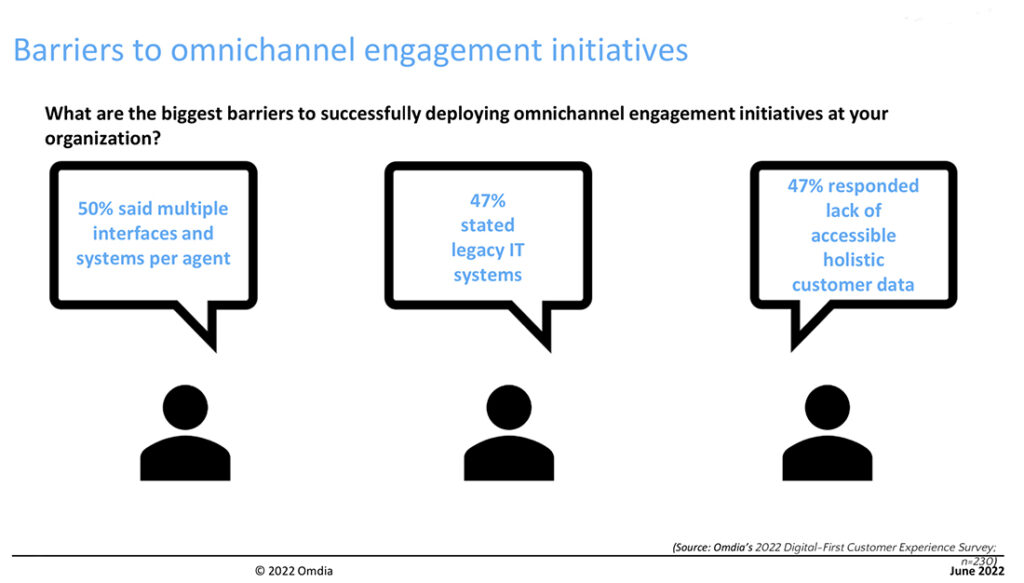Empowering contact center agents can lead to lower turnover, higher productivity and an improved customer experience (CX). But many organizations lack the tools, training and support to deliver those benefits in a remote or hybrid work environment.
“It’s difficult to engage and train agents, especially when working from home,” said David Myron, principal analyst, Omdia. “Only about half of organizations say their CX agents are equipped with tools that enable full capability.” Myron outlined findings of Omdia’s 2022 Digital-First Customer Experience Survey at a recent Enterprise Connect webinar, “Back to Basics: Agent Engagement Tops 2022 Contact Center Priority List,” hosted by Tim Richter, product marketing director, Twilio Flex.
Noting that live phone support usage has increased significantly since the pandemic, Myron said many organizations are struggling to meet customer expectations over voice and digital channels. For agents, the key barriers to omnichannel engagement include multiple interfaces and systems per agent, legacy IT systems and lack of accessible holistic customer data, according to Omdia’s 2022 Digital-First Customer Experience Survey.
So what’s needed? Myron pointed to three opportunities: providing an integrated view of data across the enterprise, investing in tools that enable intelligent, proactive engagement and giving agents real-time access to customer insights and journey data.
Other suggestions include providing agents with best-practice solutions for common problems, and offering ongoing training to promote career opportunities.
“Companies need to leverage these agent tools and data to reduce friction and improve agent engagement,” he said. “In that way, organizations can become a talent destination, while boosting CX as a driver of top-line revenue growth.”

Putting people first
Other tips for improving agent engagement and the overall user experience were presented by Adam Holtby, principal analyst, Omdia, at an in-person Enterprise Connect session, “Workplace 2025: The Future of Work–Putting People First.”
“Technology will have an important role to play in helping businesses improve employee experiences,” said Holtby. “But adopting approaches that look beyond the technology will also be vital, as the digital and physical employee experiences are merging.”
Holtby emphasized the importance of building an internal culture that provides users with a sense of connectedness as well as collaborative tools. He said organizations must overcome feeling of isolation in remote workers, and adopt practices that improve agent sentiment.
Another recommendation is building workflow process to help agents engineer and orchestrate new digital experiences. That includes incorporating artificial intelligence (AI) tools to provide real-time information to agents. “What good is having more information about the customer, if we don’t know what to do with it?”
Holtby also noted the importance of setting clear goals with business-related metrics to measure the success of user experience initiatives. Bringing the business units is essential, as those goals must be customized for each organization, he added. In his summary, Holtby called for integrated approaches to empowering agents and other users. “No single technology or solution will meet every need,” he said. “People, processes, technology, and places must all be considered as part of any improvement effort. An ecosystem approach is more desirable, and don’t forget to enhance existing partnerships in addition to exploring new opportunities.”
